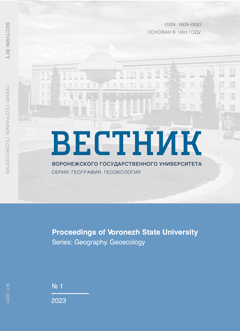Географическое изучение «умных городов»: приоритеты, подходы, перспективы
Аннотация
Цель: выявить существующие подходы и наметить контуры будущих подходов к комплексному географическому изучению «умных городов». Информационной базой служат одна отечественная и семь международных библиографических баз данных. Методы: сравнительный анализ и авторский алгоритм семантического поиска на основе машинного обучения. Результаты и обсуждение. Выявлена 91 статья. Показано распределение статей по странам и масштабам исследования. Анализ статей позволил идентифицировать восемь существующих подходов: сравнительно-географический, пространственно-урбанистический, районный, геополитический, пространственно-сегрегационный, темпорально-ландшафтный, пространственно-диффузионный и геосистемный. Сделано предположение, что в будущем могут появиться еще три подхода: позиционно-географический, потоковый и системно-расселенческий. Относительно небольшое количество статей указывает на стадию становления рассматриваемых исследований. В дальнейшем возможна конвергенция всех подходов в единую методологию географического изучения «умных городов».
Скачивания
Литература
2. Blanutsa V. I. Social'no-ekonomicheskoe rajonirovanie v epohu bol'shih dannyh [Socio-Economic Zoning in the Era of Big Data]. Moscow: INFRA-M, 2018. 194 p. (In Russ.)
3. Blanutsa V. I. Информационно-сетевая география [Information-Network Geography]. Moscow: INFRA-M, 2019. 243 p. (In Russ.)
4. Blanutsa V. I. Regional'nye ekonomicheskie issledovaniya s ispol'zovaniem algoritmov iskusstvennogo intellekta: sostoyanie i perspektivy [Regional economic research using artificial intelligence algorithms: State and prospects]. Vestnik Zabajkal'skogo gosudarstvennogo universiteta, 2020, vol. 26, no. 8, pp. 100-111. (In Russ.) DOI
5. Adam S. A critical geographical analysis of the smart city concept – Theoretical background and possible research directions. Ter es Tarsadalom, 2020, vol. 34, no. 2, pp. 88-107. DOI
6. Angelidou M. Smart city policies: A spatial approach. Cities, 2014, vol. 41, pp. S3-S11. DOI
7. Blanutsa V. I. Economic-geographical location: Generalization of conceptual frameworks and generation of new meanings. Geography and Natural Resources, 2015, vol. 36, no. 4, pp. 319-326. DOI
8. Borsekova K., Koróny S., Vaňová A., Vitálišová K. Functionality between the size indicators of smart cities: A research challenge with policy implications. Cities, 2018, vol. 78, pp. 17-26. DOI
9. Calzada I. Problematizing and politicizing smart city-regions: Is devolution smart? Territorio, 2017, vol. 83, pp. 37-47. DOI
10. Caragliu A., Del Bo C., Nijkamp P. Smart cities in Europe. Journal of Urban Technology, 2011, vol. 18, no. 2, pp. 65-82. DOI
11. Caragliu A., Del Bo C. Much ado about something? An appraisal of the relationship between smart city and smart specialization policies. Tijdschrift voor Economische en Sociale Geographie, 2018, vol. 109, no. 1, pp. 129-143. DOI
12. Chen X., Wei L., Zhang H. Spatial and temporal pattern of urban smart development in China and its driving mechanism. Chinese Geographical Science, 2018, vol. 28, no. 4, pp. 584-599. DOI
13. Coletta C., Heaphy L., Kitchin R. From the accidental to articulated smart city: The creation and work of “Smart Dublin”. European Urban and Regional Studies, 2019, vol. 26, no. 4, pp. 349-364. DOI
14. De Falco S., Angelidou M., Addie J.-P.D. From the “smart city” to the “smart metropolis”? Building resilience in the urban periphery. European Urban and Regional Studies, 2019, vol. 26, no. 2, pp. 205-223. DOI
15. Desdemoustier J., Crutzen N., Giffinger R. Municipalities’ understanding of the Smart City concept: An exploratory analysis in Belgium. Technological Forecasting and Social Change, 2019, vol. 142, pp. 129-141. DOI
16. Fariniuk T. M. D. Smart cities and the pandemic: Digital technologies on the urban management of Brazilian cities. Revista de Administração Pública, 2020, vol. 54, no. 4, pp. 860-873.
17. Georgescu M., Tugui A., Pavaloaia V.-D. The race for making up the list of emergent smart cities. An Eastern European country’s approach. Transformation in Business and Economics, 2015, vol. 14, no. 2A, pp. 529-548.
18. Giffinger R., Fertner C., Kramar H., Kalasek R., Pichler-Milanović N., Meijers E. Smart Cities – Ranking of European Medium-Sized Cities. Vienna: Centre of Regional Science, Vienna University of Technology, 2007. 24 p.
19. Goodspeed R. Smart cities: Moving beyond urban cybernetics to tackle wicked problems. Cambridge Journal of Regions, Economy and Society, 2015, vol. 8, no. 1, pp. 79-92. DOI
20. Hagerstrand T. Innovation Diffusion as a Spatial Process. Chicago: The University of Chicago Press, 1967. 350 p.
21. Herrschel T. Competitiveness and sustainability: Can “smart city regionalism” square the circle? Urban Studies, 2013, vol. 50, no. 11, pp. 2332-2348. DOI
22. Hollands R.G. Will the real smart city please stand up? Intelligent, progressive or entrepreneurial? City, 2008, vol. 12, no. 3, pp. 303-320. DOI
23. Ingwersen P., Serrano-López A.E. Smart city research 1990–2016. Scientometrics, 2018, vol. 117, no. 2, pp. 1205-1236. DOI
24. Ivaldi E., Penco L., Isola G., Musso E. Smart sustainable cities and the urban knowledge-based economy: A NUTS3 level analysis. Social Indicators Research, 2020, vol. 150, pp. 45-72. DOI
25. Kim H.-K., Yi M.-S., Shin D.-B. Regional diffusion of smart city service in South Korea investigated by spatial autocorrelation: Focused on safety and urban management. Spatial Information Research, 2017, vol. 25, no. 6, pp. 837-848. DOI
26. Kitchin R. The timescape of smart cities. Annals of the American Association of Geographers, 2019, vol. 109, no. 3, pp. 775-790. DOI
27. Kourtit K., Nijkamp P. Smart cities in smart space: A regional science perspective. Scienze Regionali, 2018, vol. 17, no. 1, pp. 105-114.
28. Lu D., Tian Y., Liu V.Y., Zhang Y. The performance of the smart cities in China – A comparative study by means of self-organizing maps and social networks analysis. Sustainability, 2015, vol. 7, no. 6, pp. 7604-7621. DOI
29. Masik G., Studzińska D. Ewolucia koncepji I badania miasta inteligentnego. Przeglad Geograficzny, 2018, vol. 90, no. 4, pp. 557-571. DOI
30. McDuie-Ra D., Lai L. Smart cities, backward frontiers: Digital urbanism in India’s north-east. Contemporary South Asia, 2019, vol. 27, no. 3, pp. 358-372. DOI
31. Mora L., Bolici R., Deakin M. The first decades of smart city research: A bibliometric analysis. Journal of Urban Technology, 2017, vol. 24, no. 1, pp. 3-27. DOI
32. Morandi C., Rolando A., di Vita S. From Smart City to Smart Region: Digital Services for an Internet of Places. Milan: Springer-Verlag, 2016. 103 p.
33. Nesti G., Graziano P. R. The democratic anchorage of governance networks in smart cities: An empirical assessment. Public Management Review, 2020, vol. 22, no. 5, pp. 648-667. DOI
34. Neville W. Managing the smart city-state: Singapore approaches the 21st century. New Zealand Geographer, 1999, vol. 55, no. 1, pp. 35-45. DOI
35. Ogrodnik K. Multi-criteria analysis of smart cities in Poland. Geographia Polonica, 2020, vol. 93, no. 2, pp. 163-181. DOI
36. Patrão C., Moura P., de Almeida A.T. Review of smart city assessment tools. Smart Cities, 2020, vol. 3, pp. 1117-1132. DOI
37. Persai P., Katiyar S. K. Development of information evaluation system for smart city planning using geoinformatics techniques. Journal of Indian Society of Remote Sensing, 2018, vol. 46, no. 11, pp. 1881-1891" target="_blank">DOI
38. Peters D. J., Hamideh S., Zarecor K. E., Ghandour M. Using entrepreneurial social infrastructure to understand smart shrinkage in small towns. Journal of Rural Studies, 2018, vol. 64, pp. 39-49. DOI
39. Picon A. Smart Cities: A Spatialised Intelligence. Chichester: John Wiley & Sons, 2015. 168 p.
40. Praharaj S., Han H. Building a typology of the 100 smart cities in India. Smart and Sustainable Built Environment, 2019, vol. 8, no. 5, pp. 400-414. DOI
41. Raspotnik A., Grønning R., Herrmann V. A tale of three cities: The concept of smart sustainable cities for the Arctic. Polar Geography, 2020, vol. 43, pp. 64-87. DOI
42. Roche S. Geographic information science I: Why does a smart city need to be spatially enabled? Progress in Human Geography, 2014, vol. 38, no. 5, pp. 703-711. DOI
43. Ruhlandt R. W. S. The governance of smart cities: A systematic literature review. Cities, 2018, vol. 81, pp. 1-23. DOI
44. Safransky S. Geographies of algorithmic violence: Redlining the smart city. International Journal of Urban and Regional Research, 2020, vol. 44, pp. 200-218. DOI
45. Shearmur R., Charron M., Pajevic F. Pourquoi seules les villes sont-elles qualifiées d’intelligentes? Un vocabulaire du biais urbain. Canadian Geographer, 2020, vol. 64, no. 2, pp. 310-322. DOI
46. Shelton T., Zook M., Wiig A. The “actually existing smart city”. Cambridge Journal of Regions, Economy and Society, 2015, vol. 8, no. 1, pp. 13-25. DOI
47. Slee B. Delivering on the concept of smart villages – in search of an enabling theory. European Countryside, 2019, vol. 11, pp. 634-650. DOI
48. Vasilić M. Operacionalizacija koncepta “pametnog” grada na primeru Srbije. Sociologija, 2018, vol. 60, no. 2, pp. 518-537. DOI
49. Wathne M. W., Haarstad H. The smart city as mobile policy: Insights on contemporary urbanism. Geoforum, 2020, vol. 108, pp. 130-138. DOI
50. Wiig A. The empty rhetoric of the smart city: From digital inclusion to economic promotion in Philadelphia. Urban Geography, 2016, vol. 37, pp. 535-553. DOI











